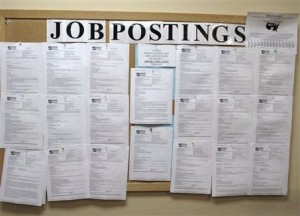Breaking Down
Posted by SmartActors | Leave a comment
One of the things that can be frustrating for actors is the feeling they are not getting information. The fantasy is “If I had only known about that part, I would have gotten it.” Note, that I used the word “fantasy”because there is little truth to that statement. Let’s put information sources into perspective and see what works and how to use them.
Like a game of “whispering down the lane,” hearing from another actor that there is a part for which you are “perfect”is information that has been interpreted out of its actual context. You are hearing something third-hand that has little resemblance to what is true or how it applies to you.
 Best way: get an actual appointment.
Best way: get an actual appointment.
Until you hear the information from your representative, all the rest is just conjecture. Your rep will tell you the facts about the role and, if you have any questions, can answer them.
Breakdowns
Breakdowns are a great source of information for your representative, but not good for  actors to use as a gauge to what’s really available. Before Gary Marsh introduced Breakdown Services in the late 1970s, agents had to go to a casting director’s office to read a script in order to find out what was casting. Now, everyone who subscribes to breakdown websites has an even shot at getting information. And while the mechanisms for the delivery and submission of breakdowns have changed since it was started, the intent of breakdowns hasn’t changed: They are to be read by representatives…not by actors.
actors to use as a gauge to what’s really available. Before Gary Marsh introduced Breakdown Services in the late 1970s, agents had to go to a casting director’s office to read a script in order to find out what was casting. Now, everyone who subscribes to breakdown websites has an even shot at getting information. And while the mechanisms for the delivery and submission of breakdowns have changed since it was started, the intent of breakdowns hasn’t changed: They are to be read by representatives…not by actors.
At face value breakdowns can be misleading for actors so, let’s look at how they are written and what they are really saying:
A breakdown is written by a person from a draft of a script that was given to him by casting.
 As I have said, scripts are written so network and studio executives can easily grasp what they are about. Therefore the characters are described in ways that might not resemble the role once it is cast. Because of the speed with which casting is conducted, breakdowns are written before the producer and the network have a concept meeting; before the producer and casting director discuss the script; and before there are any sessions that might show what does and does not work. In reality, none of this might even matter since networks and studios have their own ideas about the role and who should play it. Those ideas always trump everything else.
As I have said, scripts are written so network and studio executives can easily grasp what they are about. Therefore the characters are described in ways that might not resemble the role once it is cast. Because of the speed with which casting is conducted, breakdowns are written before the producer and the network have a concept meeting; before the producer and casting director discuss the script; and before there are any sessions that might show what does and does not work. In reality, none of this might even matter since networks and studios have their own ideas about the role and who should play it. Those ideas always trump everything else.
Just because a part is listed doesn’t mean it’s available.
Look at the end of a description: The words “names only,” “offers only,” or “large guest star” mean that the role will  be offered and noauditions will be conducted. If the description says,“really handsome” or “looks like a model,” take those words at face value: If you do not fit that description, there is no window for proving how right you would be for the role. Producers want to cast an actor who is so like the character that audiences will know what is going on without further exposition.
be offered and noauditions will be conducted. If the description says,“really handsome” or “looks like a model,” take those words at face value: If you do not fit that description, there is no window for proving how right you would be for the role. Producers want to cast an actor who is so like the character that audiences will know what is going on without further exposition.
I very clearly state that a lot of the films that are listed are not “go” projects. This is not because they are scams. It is because, until a project has the financing and a green light, it does not exist, so actors should be careful in how they read about films. Sometimes you and everyone else lists them when they are just in early stages of development and not even close to being ready for casting. Yes, sometimes, especially indie films are listed as “go” projects when they are not. This is not because they are scams. Rather they exist in the hope that the director or producer will get an element that will make the film a go, and that does not always happen. Therefore, again, just because a film is listed, does not mean that any of the roles an actor reads about will ever be cast.
Periodical postings.
Online or paper periodicals list many different types of productions but many of these projects are listed without stating their status. You might read about something that is not written, in an early stage of development, or on hold. It may be months or years, if ever, before it gets a green light. A quick trip to IMDbpro (IMDb does not list the information as to the status of a film in terms of development, casting, in production, etc. That information can only be read on IMDbpro) could help you to clarify the situation. Additionally, many of the listings are for nonunion films, so check that out before you submit yourself. On the topic of submissions, casting directors for scripted TV projects and union films  only look at submissions that come from agents and managers. It is a waste of your time and money to send in an unsolicited picture and résumé as they will, generally, not be opened.
only look at submissions that come from agents and managers. It is a waste of your time and money to send in an unsolicited picture and résumé as they will, generally, not be opened.
Periodicals are a good source for info about student films, some theater productions, and Web series. They also list Equity open calls since, by agreement, every Equity production in NYC must have an open call. If you don’t have an agent, it is a good experience to go to an open call, but be aware that scheduled auditions and offers are the main source of the process.
The roller coaster ride of being an actor is fraught with anticipation and disappointment. Don’t add to this by blindly following everything you hear. Check out the source of the information and decide how it relates to wherever you are in your career. Don’t get angry about a role in a movie or a TV show you saw and know would have been right for you if only you had the chance to audition. Understand that there might not have been any auditions or that a part might have been cast locally from the production’s location. Don’t drive yourself nuts over something that was never available to you. Go for what is attainable and progress from there. Is the way casting works fair? Not always, but no one ever told you it would be. As with any industry, ours is a business and a subjective one, at that. You cannot change its structure but, if you understand how it works, you can learn to be creative within it and avoid unwarranted frustration.
Written By: Joan Sittenfield Via Backstage
